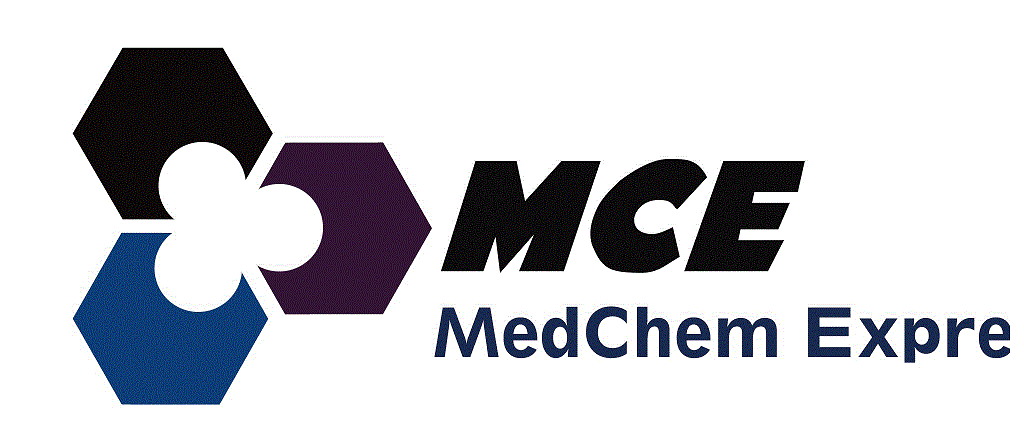MedChem Express
Macrocarpal C can be isolated from the 95 % ethanol extract of fresh leaves of E. globulus. Macrocarpal C inhibits the growth of T. mentagrophytes via an increase in the permeability of the fungal membrane. Macrocarpal C increases the production of intracellular ROS and? induces apoptosis as a consequence of DNA fragmentation[1].
More Information
Supplier Page
MedChem Express
MedChem Express
Macrocarpal I is a phloroglucinol coupled sesquiterpenoid with antifungal activity. Macrocarpal I against C. glabrata with an IC50 value of 0.75 μg/mL. Macrocarpal I can be isolated from the juvenile leaves of E. maideni[1].
More Information
Supplier Page
MedChem Express
Macrocarpal J, a phloroglucinol sesquiterpene-coupled compound, can be isolated from the leaves of Eucalyptus globulus.
More Information
Supplier Page
MedChem Express
MedChem Express
MedChem Express
MedChem Express
MedChem Express
MedChem Express
Macrophages are effector cells of the innate immune system, engulfing bacteria and secreting pro-inflammatory and antibacterial mediators. They are an important component of the first line defense against pathogens and tumor cells. In addition, macrophages play an important role in eliminating damaged cells through programmed cell death. Like all immune cells, macrophages originate from pluripotent […]
More Information
Supplier Page
MedChem Express
MedChem Express
MedChem Express
Maculatin 1.1 TFA is an antimicrobial peptide with an MIC against Staphylococcus aureus of 7 μM. Maculatin 1.1 TFA can perforate the bacterial membrane of Staphylococcus aureus, causing bacterial death[1].
More Information
Supplier Page
MedChem Express
Maculatin 1.1 TFA is an antimicrobial peptide with an MIC against Staphylococcus aureus of 7 μM. Maculatin 1.1 TFA can perforate the bacterial membrane of Staphylococcus aureus, causing bacterial death[1].
More Information
Supplier Page
MedChem Express
Maculosidine is a furoquinoline alkaloid that can be isolated from Balfourodendron riedelianum. Maculosidine inhibits ATP synthesis, basal, phosphorylating and uncoupled electron transport in plants. Maculosidine inhibits Hill reaction on spinach chloroplasts[1].
More Information
Supplier Page
MedChem Express
Madecassic acid (Standard) is the analytical standard of Madecassic acid. This product is intended for research and analytical applications. Madecassic acid is isolated from Centella asiatica (Umbelliferae). Madecassic acid has anti-inflammatory properties caused by iNOS, COX-2, TNF-alpha, IL-1beta, and IL-6 inhibition via the downregulation of NF-κB activation in RAW 264.7 macrophage cells[1].
More Information
Supplier Page
MedChem Express
MedChem Express
Maduramicin (Maduramycin) is isolated from the actinomycete Actinomadura rubra. Maduramicin is an anticoccidial agent for the the treatment of Eimeria spp., E. adenoeides, E. gallopavonis, and E. dispersa infection[1]. Maduramicin induces cell apoptosis in chicken myocardial cells via intrinsic and extrinsic pathways[2].
More Information
Supplier Page
MedChem Express
Maftivimab (REGN3470-3471-3479), the inhibitor of Filovirus, is an Food and agent Administration (FDA)-approved agent. Maftivimab, also named as Atoltivimab, Odesivimab (Inmazeb), can be used for research of Zaire ebolavirus infection[1].
More Information
Supplier Page
MedChem Express
Magenta-β-D-GlcA is a biochemical reagent that can be used as a biological material or organic compound for life science related research.
More Information
Supplier Page
MedChem Express
MAGL-IN-10 is areversible monoacylglycerol lipase (MAGL) inhibitor with very good ADME properties and low in vivo toxicity.MAGL-IN-10 can be used for the research ofcancer, neurological disorders and inflammatory pathologies[1].
More Information
Supplier Page
MedChem Express
MAGL-IN-11 (compound 29) is a selective and reversible MAGL inhibitor. MAGL-IN-11 has the potential to study inflammation, cancer and antioxidants[1].
More Information
Supplier Page
MedChem Express
SAR127303 is an orally active, selective, competitive monoacylglycerol lipase (MAGL) covalent inhibitor with IC50s of 3.8 nM and 29 nM for mouse and human MAGL, respectively. SAR127303 potently elevates hippocampal levels of 2-AG in mice. SAR127303 decreased long term potentiation (LTP) of CA1 synaptic transmission and acetylcholine release in the hippocampus. SAR127303 produces antinociceptive effects […]
More Information
Supplier Page
MedChem Express
MAGL-IN-13 (compound (3R, 4S) – 5v) is a selective, irreversible inhibitor for MAGL,with IC50 values of 0.026, 0.021 and 0.24 nM for mMAGL, hMAGL and rMAGL, respectively. MAGL-IN-13 can penetrant blood brain barrier. [1].
More Information
Supplier Page
MedChem Express
MAGL-IN-8 (compound 13) is a reversible monoacylglycerol lipase (MAGL) inhibitor, with an IC50 of 2.5 ± 0.4 nM for hMAGL[1].
More Information
Supplier Page
MedChem Express
MedChem Express
Magmas-IN-1 (compound 9) is a small molecule Magmas inhibitor (SMMI). Magmas is mitochondria associated,granulocyte-macrophage colony stimulating factor signaling molecule,as well as a GM-CSF inducible gene in myeloid cells. Magmas-IN-1 inhibits Magmas and modulates mitochondrial function. Magmas-IN-1 also inhibits proliferation in yeast at 4 μM[1].
More Information
Supplier Page
MedChem Express
Magnesium acetate tetrahydrate is a hydrated form of anhydrous magnesium acetate salt. As a salt form of Magnesium, Magnesium acetate tetrahydrate is one of the bioavailable forms of magnesium and forms a very water soluble compound. Magnesium acetate tetrahydrate can be used as an electrolyte supplementation or a reagent in molecular biology experiments[1].
More Information
Supplier Page
MedChem Express
Magnesium acetate tetrahydrate, for molecular biology is an inorganic salt that can be used for molecular biology[1].
More Information
Supplier Page
MedChem Express
Magnesium stearate is a commonly used pharmaceutical lubricant. But Magnesium stearate leads to an adverse effect on bonding between particles. Magnesium stearate can be used as an excipient, such as lubricant. Pharmaceutical excipients, or pharmaceutical auxiliaries, refer to other chemical substances used in the pharmaceutical process other than pharmaceutical ingredients. Pharmaceutical excipients generally refer to […]
More Information
Supplier Page
MedChem Express
Magnesium stearate is a commonly used pharmaceutical lubricant. But Magnesium stearate leads to an adverse effect on bonding between particles. Magnesium stearate can be used as an excipient, such as lubricant. Pharmaceutical excipients, or pharmaceutical auxiliaries, refer to other chemical substances used in the pharmaceutical process other than pharmaceutical ingredients. Pharmaceutical excipients generally refer to […]
More Information
Supplier Page
MedChem Express
Magnesium sulfate heptahydrate, for cell culture is a biochemical assay reagent and is suitable fo cell culture[1].
More Information
Supplier Page
MedChem Express
Magnesium sulfate heptahydrate, for molecular biology is a biochemical assay reagent and is suitable fo molecular biology.
More Information
Supplier Page
MedChem Express
Magnesium sulfate heptahydrate (Epsom salts) is currently the anticonvulsant of choice for the prevention and control of eclamptic fits. Magnesium sulfate is also widely used as a tocolytic agent[1][2].
More Information
Supplier Page
MedChem Express
Magnesium sulfate heptahydrate, United States Pharmacopeia (USP) Reference Standard is an inorganic salt that can be used for life science related research[1].
More Information
Supplier Page
MedChem Express
Magnesium sulfate, suitable for cell culture, bioreagent. Magnesium sulfate is also widely used as a tocolytic agent[1].
More Information
Supplier Page
MedChem Express
Magnesium meso-tetraphenylporphine is a biochemical reagent that can be used as a biological material or organic compound for life science related research.
More Information
Supplier Page
MedChem Express
MedChem Express
Magnoloside A (compound 4) is a main phenylethanoid glycoside in Houpo. Magnoloside A can be used in the research of functional dyspepsia (FD)[1].
More Information
Supplier Page
MedChem Express
Magnoloside B is an α-glucosidase inhibitor (IC50=0.69 mM), which can be obtained from Magnolia officinalis stem bark. Magnoloside B shows moderate inhibitory activity against MGC-803 and HepG2 cells. Magnoloside B has the potential to study cancer and diabetes[1].
More Information
Supplier Page
MedChem Express
Magnoloside F is a natural compound that can be isolated from the Magnolia officinalis, and has antioxidant activity[1].
More Information
Supplier Page
MedChem Express
MedChem Express
Mahanimbidine is a terpenoid alkaloid. Mahanimbidine can be isolated from the leaves and stem skins of the Murraya koenigii Spreng[1][2].
More Information
Supplier Page
MedChem Express
Majoranaquinone exhibits a high antibacterial effect against 4 Staphylococcus, 1 Moraxella, and 1 Enterococcus strains. Majoranaquinone shows substantial efflux pump inhibitory activity in Escherichia coliATCC 25922 strain. Majoranaquinone is found to be an effective biofilm formation inhibitor on E.coli, ATCC 25922 and E. coli K-12 AG100 bacteria[1].
More Information
Supplier Page
MedChem Express
MAK683-CH2CH2COOH binds to EED (embryonic ectoderm development protein). MAK683-CH2CH2COOH and a VHL ligand for the E3 ubiquitin ligase have been used to design PROTAC EED degrader-1 (HY-130614) and PROTAC EED degrader-2 (HY-130615)[1].
More Information
Supplier Page
MedChem Express
MAK683-CH2CH2COOH binds to EED (embryonic ectoderm development protein). MAK683-CH2CH2COOH and a VHL ligand for the E3 ubiquitin ligase have been used to design PROTAC EED degrader-1 (HY-130614) and PROTAC EED degrader-2 (HY-130615)[1].
More Information
Supplier Page
MedChem Express
MAK683-CH2CH2COOH binds to EED (embryonic ectoderm development protein). MAK683-CH2CH2COOH and a VHL ligand for the E3 ubiquitin ligase have been used to design PROTAC EED degrader-1 (HY-130614) and PROTAC EED degrader-2 (HY-130615)[1].
More Information
Supplier Page
MedChem Express
MAK683-CH2CH2COOH binds to EED (embryonic ectoderm development protein). MAK683-CH2CH2COOH and a VHL ligand for the E3 ubiquitin ligase have been used to design PROTAC EED degrader-1 (HY-130614) and PROTAC EED degrader-2 (HY-130615)[1].
More Information
Supplier Page
MedChem Express
MAK683-CH2CH2COOH binds to EED (embryonic ectoderm development protein). MAK683-CH2CH2COOH and a VHL ligand for the E3 ubiquitin ligase have been used to design PROTAC EED degrader-1 (HY-130614) and PROTAC EED degrader-2 (HY-130615)[1].
More Information
Supplier Page
MedChem Express




